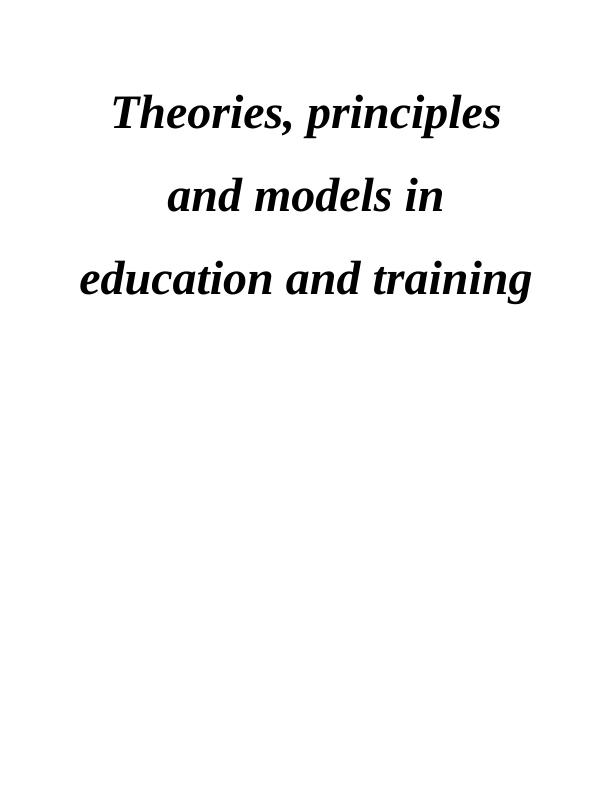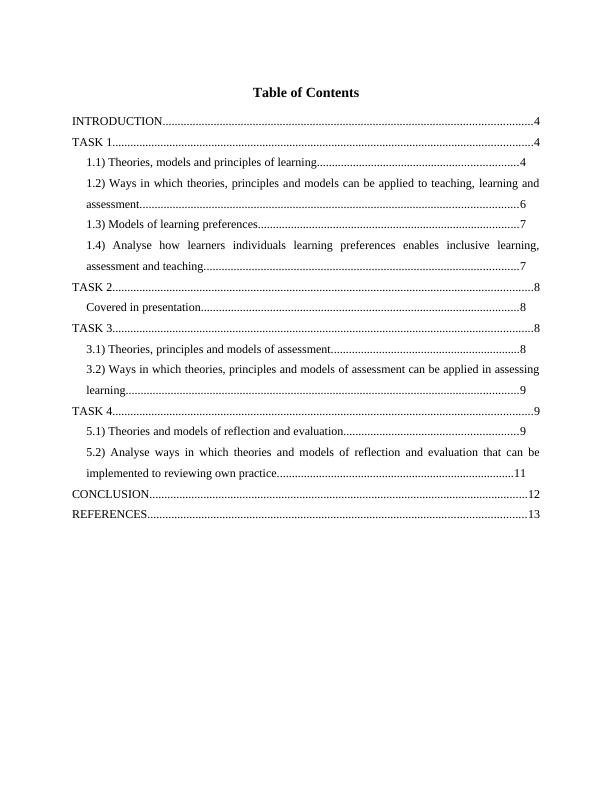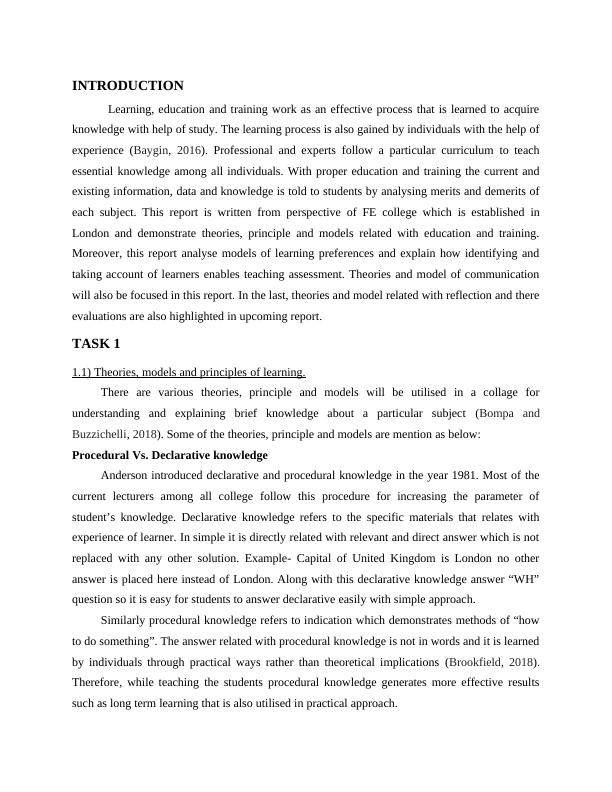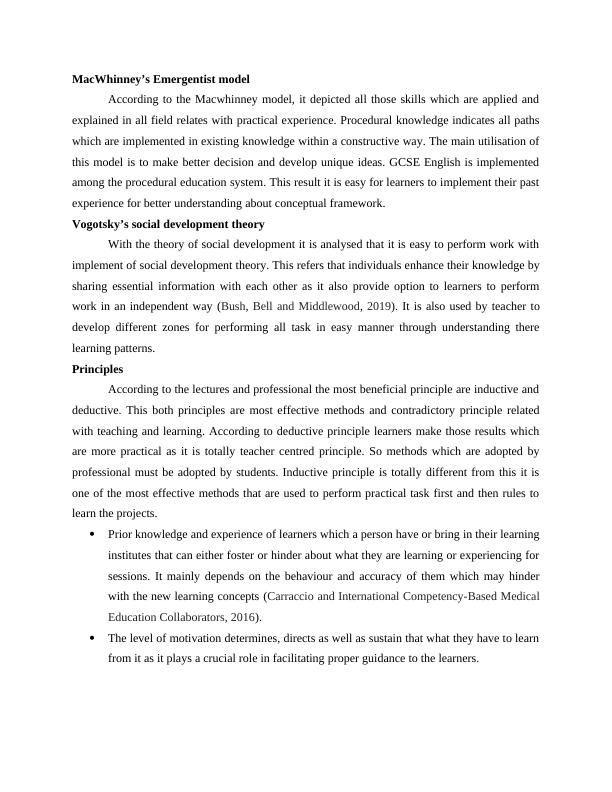Theories, Principles, and Models in Education and Training
Added on 2023-01-12
13 Pages4185 Words74 Views
Theories, principles
and models in
education and training
and models in
education and training

Table of Contents
INTRODUCTION...........................................................................................................................4
TASK 1............................................................................................................................................4
1.1) Theories, models and principles of learning...................................................................4
1.2) Ways in which theories, principles and models can be applied to teaching, learning and
assessment..............................................................................................................................6
1.3) Models of learning preferences.......................................................................................7
1.4) Analyse how learners individuals learning preferences enables inclusive learning,
assessment and teaching.........................................................................................................7
TASK 2............................................................................................................................................8
Covered in presentation..........................................................................................................8
TASK 3............................................................................................................................................8
3.1) Theories, principles and models of assessment...............................................................8
3.2) Ways in which theories, principles and models of assessment can be applied in assessing
learning...................................................................................................................................9
TASK 4............................................................................................................................................9
5.1) Theories and models of reflection and evaluation..........................................................9
5.2) Analyse ways in which theories and models of reflection and evaluation that can be
implemented to reviewing own practice...............................................................................11
CONCLUSION..............................................................................................................................12
REFERENCES..............................................................................................................................13
INTRODUCTION...........................................................................................................................4
TASK 1............................................................................................................................................4
1.1) Theories, models and principles of learning...................................................................4
1.2) Ways in which theories, principles and models can be applied to teaching, learning and
assessment..............................................................................................................................6
1.3) Models of learning preferences.......................................................................................7
1.4) Analyse how learners individuals learning preferences enables inclusive learning,
assessment and teaching.........................................................................................................7
TASK 2............................................................................................................................................8
Covered in presentation..........................................................................................................8
TASK 3............................................................................................................................................8
3.1) Theories, principles and models of assessment...............................................................8
3.2) Ways in which theories, principles and models of assessment can be applied in assessing
learning...................................................................................................................................9
TASK 4............................................................................................................................................9
5.1) Theories and models of reflection and evaluation..........................................................9
5.2) Analyse ways in which theories and models of reflection and evaluation that can be
implemented to reviewing own practice...............................................................................11
CONCLUSION..............................................................................................................................12
REFERENCES..............................................................................................................................13

INTRODUCTION
Learning, education and training work as an effective process that is learned to acquire
knowledge with help of study. The learning process is also gained by individuals with the help of
experience (Baygin, 2016). Professional and experts follow a particular curriculum to teach
essential knowledge among all individuals. With proper education and training the current and
existing information, data and knowledge is told to students by analysing merits and demerits of
each subject. This report is written from perspective of FE college which is established in
London and demonstrate theories, principle and models related with education and training.
Moreover, this report analyse models of learning preferences and explain how identifying and
taking account of learners enables teaching assessment. Theories and model of communication
will also be focused in this report. In the last, theories and model related with reflection and there
evaluations are also highlighted in upcoming report.
TASK 1
1.1) Theories, models and principles of learning.
There are various theories, principle and models will be utilised in a collage for
understanding and explaining brief knowledge about a particular subject (Bompa and
Buzzichelli, 2018). Some of the theories, principle and models are mention as below:
Procedural Vs. Declarative knowledge
Anderson introduced declarative and procedural knowledge in the year 1981. Most of the
current lecturers among all college follow this procedure for increasing the parameter of
student’s knowledge. Declarative knowledge refers to the specific materials that relates with
experience of learner. In simple it is directly related with relevant and direct answer which is not
replaced with any other solution. Example- Capital of United Kingdom is London no other
answer is placed here instead of London. Along with this declarative knowledge answer “WH”
question so it is easy for students to answer declarative easily with simple approach.
Similarly procedural knowledge refers to indication which demonstrates methods of “how
to do something”. The answer related with procedural knowledge is not in words and it is learned
by individuals through practical ways rather than theoretical implications (Brookfield, 2018).
Therefore, while teaching the students procedural knowledge generates more effective results
such as long term learning that is also utilised in practical approach.
Learning, education and training work as an effective process that is learned to acquire
knowledge with help of study. The learning process is also gained by individuals with the help of
experience (Baygin, 2016). Professional and experts follow a particular curriculum to teach
essential knowledge among all individuals. With proper education and training the current and
existing information, data and knowledge is told to students by analysing merits and demerits of
each subject. This report is written from perspective of FE college which is established in
London and demonstrate theories, principle and models related with education and training.
Moreover, this report analyse models of learning preferences and explain how identifying and
taking account of learners enables teaching assessment. Theories and model of communication
will also be focused in this report. In the last, theories and model related with reflection and there
evaluations are also highlighted in upcoming report.
TASK 1
1.1) Theories, models and principles of learning.
There are various theories, principle and models will be utilised in a collage for
understanding and explaining brief knowledge about a particular subject (Bompa and
Buzzichelli, 2018). Some of the theories, principle and models are mention as below:
Procedural Vs. Declarative knowledge
Anderson introduced declarative and procedural knowledge in the year 1981. Most of the
current lecturers among all college follow this procedure for increasing the parameter of
student’s knowledge. Declarative knowledge refers to the specific materials that relates with
experience of learner. In simple it is directly related with relevant and direct answer which is not
replaced with any other solution. Example- Capital of United Kingdom is London no other
answer is placed here instead of London. Along with this declarative knowledge answer “WH”
question so it is easy for students to answer declarative easily with simple approach.
Similarly procedural knowledge refers to indication which demonstrates methods of “how
to do something”. The answer related with procedural knowledge is not in words and it is learned
by individuals through practical ways rather than theoretical implications (Brookfield, 2018).
Therefore, while teaching the students procedural knowledge generates more effective results
such as long term learning that is also utilised in practical approach.

MacWhinney’s Emergentist model
According to the Macwhinney model, it depicted all those skills which are applied and
explained in all field relates with practical experience. Procedural knowledge indicates all paths
which are implemented in existing knowledge within a constructive way. The main utilisation of
this model is to make better decision and develop unique ideas. GCSE English is implemented
among the procedural education system. This result it is easy for learners to implement their past
experience for better understanding about conceptual framework.
Vogotsky’s social development theory
With the theory of social development it is analysed that it is easy to perform work with
implement of social development theory. This refers that individuals enhance their knowledge by
sharing essential information with each other as it also provide option to learners to perform
work in an independent way (Bush, Bell and Middlewood, 2019). It is also used by teacher to
develop different zones for performing all task in easy manner through understanding there
learning patterns.
Principles
According to the lectures and professional the most beneficial principle are inductive and
deductive. This both principles are most effective methods and contradictory principle related
with teaching and learning. According to deductive principle learners make those results which
are more practical as it is totally teacher centred principle. So methods which are adopted by
professional must be adopted by students. Inductive principle is totally different from this it is
one of the most effective methods that are used to perform practical task first and then rules to
learn the projects.
Prior knowledge and experience of learners which a person have or bring in their learning
institutes that can either foster or hinder about what they are learning or experiencing for
sessions. It mainly depends on the behaviour and accuracy of them which may hinder
with the new learning concepts (Carraccio and International Competency-Based Medical
Education Collaborators, 2016).
The level of motivation determines, directs as well as sustain that what they have to learn
from it as it plays a crucial role in facilitating proper guidance to the learners.
According to the Macwhinney model, it depicted all those skills which are applied and
explained in all field relates with practical experience. Procedural knowledge indicates all paths
which are implemented in existing knowledge within a constructive way. The main utilisation of
this model is to make better decision and develop unique ideas. GCSE English is implemented
among the procedural education system. This result it is easy for learners to implement their past
experience for better understanding about conceptual framework.
Vogotsky’s social development theory
With the theory of social development it is analysed that it is easy to perform work with
implement of social development theory. This refers that individuals enhance their knowledge by
sharing essential information with each other as it also provide option to learners to perform
work in an independent way (Bush, Bell and Middlewood, 2019). It is also used by teacher to
develop different zones for performing all task in easy manner through understanding there
learning patterns.
Principles
According to the lectures and professional the most beneficial principle are inductive and
deductive. This both principles are most effective methods and contradictory principle related
with teaching and learning. According to deductive principle learners make those results which
are more practical as it is totally teacher centred principle. So methods which are adopted by
professional must be adopted by students. Inductive principle is totally different from this it is
one of the most effective methods that are used to perform practical task first and then rules to
learn the projects.
Prior knowledge and experience of learners which a person have or bring in their learning
institutes that can either foster or hinder about what they are learning or experiencing for
sessions. It mainly depends on the behaviour and accuracy of them which may hinder
with the new learning concepts (Carraccio and International Competency-Based Medical
Education Collaborators, 2016).
The level of motivation determines, directs as well as sustain that what they have to learn
from it as it plays a crucial role in facilitating proper guidance to the learners.

End of preview
Want to access all the pages? Upload your documents or become a member.
Related Documents
Theories, Principles and Models in Education and Traininglg...
|17
|6263
|2
Theories, Principles and Models of Learning and Teaching in Educationlg...
|17
|4633
|182
Analysis Theories, Principles, Models of Learning Preferences : Assignmentlg...
|34
|9367
|354
Theories, Principals and Models In education and traininglg...
|12
|3585
|40
Theories, Principles, and Models of Learning in Education and Traininglg...
|19
|6448
|30
Theories, Principles and Models in Education for Inspirational Teaching and Learninglg...
|18
|4324
|163
